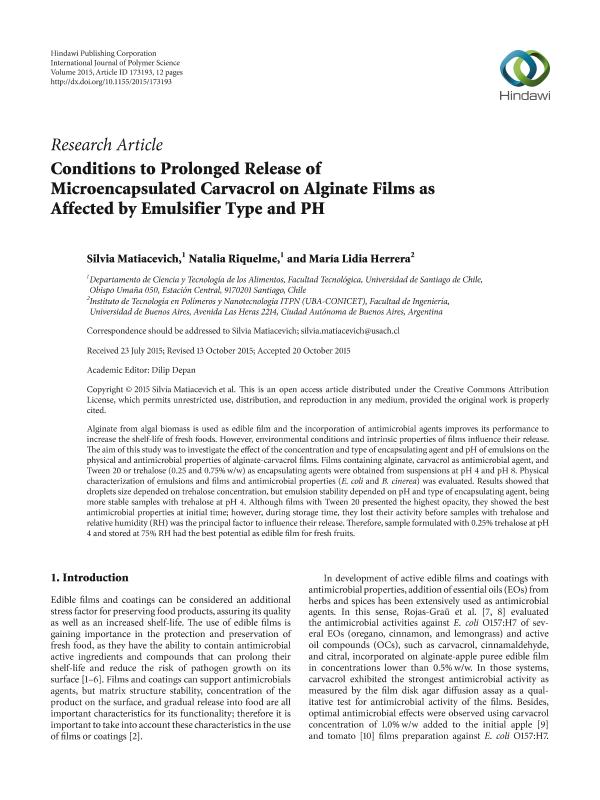Mostrar el registro sencillo del ítem
dc.contributor.author
Matiacevich, Silvia Beatriz

dc.contributor.author
Riquelme, Natalia
dc.contributor.author
Herrera, Maria Lidia

dc.date.available
2016-07-15T19:47:47Z
dc.date.issued
2015-12
dc.identifier.citation
Matiacevich, Silvia Beatriz; Riquelme, Natalia; Herrera, Maria Lidia; Conditions to Prolonged Release of Microencapsulated Carvacrol on Alginate Films as Affected by Emulsifier Type and PH; Hindawi Publishing Corporation; International Journal of Polymer Science; 2015; 12-2015; 173193-173193
dc.identifier.issn
1687-9422
dc.identifier.uri
http://hdl.handle.net/11336/6551
dc.description.abstract
Alginate from algal biomass is used as edible film and the incorporation of antimicrobial agents improves its performance toincrease the shelf-life of fresh foods. However, environmental conditions and intrinsic properties of films influence their release.The aim of this study was to investigate the effect of the concentration and type of encapsulating agent and pH of emulsions on thephysical and antimicrobial properties of alginate-carvacrol films. Films containing alginate, carvacrol as antimicrobial agent, andTween 20 or trehalose (0.25 and 0.75% w/w) as encapsulating agents were obtained from suspensions at pH 4 and pH 8. Physicalcharacterization of emulsions and films and antimicrobial properties (E. coli and B. cinerea) was evaluated. Results showed thatdroplets size depended on trehalose concentration, but emulsion stability depended on pH and type of encapsulating agent, beingmore stable samples with trehalose at pH 4. Although films with Tween 20 presented the highest opacity, they showed the bestantimicrobial properties at initial time; however, during storage time, they lost their activity before samples with trehalose andrelative humidity (RH) was the principal factor to influence their release. Therefore, sample formulated with 0.25% trehalose at pH4 and stored at 75% RH had the best potential as edible film for fresh fruits.
dc.format
application/pdf
dc.language.iso
eng
dc.publisher
Hindawi Publishing Corporation

dc.rights
info:eu-repo/semantics/openAccess
dc.rights.uri
https://creativecommons.org/licenses/by/2.5/ar/
dc.subject
Alginate Films
dc.subject
Carvacrol
dc.subject
Control Release
dc.subject.classification
Alimentos y Bebidas

dc.subject.classification
Otras Ingenierías y Tecnologías

dc.subject.classification
INGENIERÍAS Y TECNOLOGÍAS

dc.title
Conditions to Prolonged Release of Microencapsulated Carvacrol on Alginate Films as Affected by Emulsifier Type and PH
dc.type
info:eu-repo/semantics/article
dc.type
info:ar-repo/semantics/artículo
dc.type
info:eu-repo/semantics/publishedVersion
dc.date.updated
2016-07-15T17:21:56Z
dc.journal.volume
2015
dc.journal.pagination
173193-173193
dc.journal.pais
Egipto

dc.journal.ciudad
El Cairo
dc.description.fil
Fil: Matiacevich, Silvia Beatriz. Universidad de Santiago de Chile; Chile
dc.description.fil
Fil: Riquelme, Natalia. Universidad de Santiago de Chile; Chile
dc.description.fil
Fil: Herrera, Maria Lidia. Consejo Nacional de Investigaciones Cientificas y Tecnicas. Oficina de Coordinacion Administrativa Houssay. Instituto de Tecnologia En Polimeros y Nanotecnologia; Argentina
dc.journal.title
International Journal of Polymer Science
dc.relation.alternativeid
info:eu-repo/semantics/altIdentifier/ark/10.1155/2015/173193
dc.relation.alternativeid
info:eu-repo/semantics/altIdentifier/doi/http://dx.doi.org/10.1155/2015/173193
dc.relation.alternativeid
info:eu-repo/semantics/altIdentifier/url/http://www.hindawi.com/journals/ijps/2015/173193/
Archivos asociados
